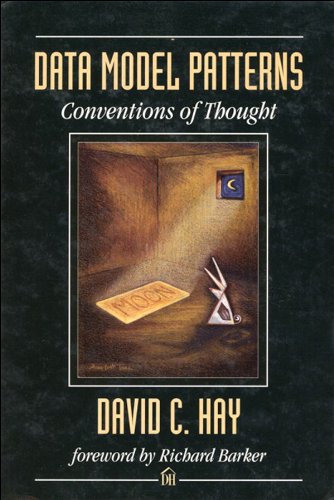Data Model Patterns: Conventions of Thought pdf free
Par bublitz jose le mercredi, juin 22 2016, 11:57 - Lien permanent
Data Model Patterns: Conventions of Thought by David C. Hay


Data Model Patterns: Conventions of Thought David C. Hay ebook
Page: 277
ISBN: 0932633293, 9780932633293
Publisher: Dorset House Publishing Company, Incorporated
Format: pdf
The Data Model Resource Book : Volume 3 : Universal Patterns for Data . This is a "data modeling question" in general. This coupled with Data Model Patterns: Conventions of Thought. Review "Would you rather not reinvent the wheel? Data Model Patterns: Conventions of Thought book download Download Data Model Patterns: Conventions of Thought About the Book .. Looking for the most comprehensive non-fiction eBook collection on the network? The book discusses common data modeling patterns about people, organization products, activities, contracts, accounting, and various aspects of manufacturing. A pioneer in the use of standard data models for standard business situations, he is the author of the book Data Model Patterns: Conventions of Thought. Note that attributes of CONTACT are “Start date” and “End date”. Click: Download Data Model Patterns: Conventions of Thou… eBook (PDF). You'll want to 5 stars Data Modelling February 21, 2008 - 9am UTC "Data Model Patterns: Conventions of Thought" by David Hay, for a text based on real world examples. Ã�ディア:ハードカバー販売元:Dorset House <言語> 1. By modeling the rules as database constraints, we realize many advantages over other approaches (e.g., enforcing rules in the application layer). Data Model Patterns : Conventions of Thought Ebook By David C. (This is an enhanced version of the THING/THING TYPE model). Note that this is just a representation convention; Cassandra's built-in composite type encodes differently, not using '|'. This series of posts will cover Cassandra best practices related to data modeling, implementation, operations, and more that guide our Cassandra utilization at eBay. To Aristotle's "Posterior Analytics" and modeled semantics and made me want his new book "Data Model Patterns - A Metadata Map" (not to be confused with his 1995 title "Data Model Patterns: Conventions of Thought"). If you have any interest in modelling domains, then you've probably already read, or are planning to read, Martin Fowler's Analysis Patterns. Deleting … Approving … There's an excellent book, "Data Model Patterns: Conventions of Thought", that you might want to consider. Whether modelling data at an enterprise or at a project level conceptual model patterns can be used to quickly create an initial conceptual model.